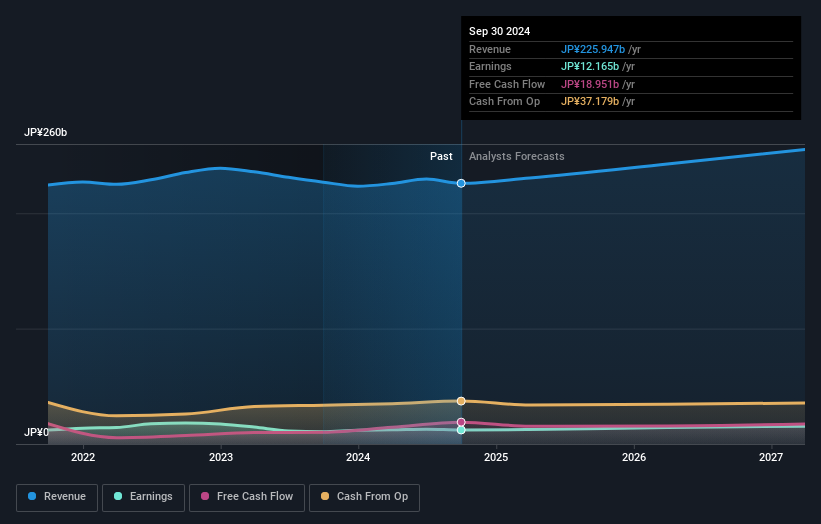- Japan
- /
- Electronic Equipment and Components
- /
- TSE:6807
Both retail investors who control a good portion of Japan Aviation Electronics Industry, Limited (TSE:6807) along with institutions must be dismayed after last week's 5.4% decrease

Key Insights
- Japan Aviation Electronics Industry's significant retail investors ownership suggests that the key decisions are influenced by shareholders from the larger public
- The top 17 shareholders own 50% of the company
- Institutional ownership in Japan Aviation Electronics Industry is 38%
To get a sense of who is truly in control of Japan Aviation Electronics Industry, Limited (TSE:6807), it is important to understand the ownership structure of the business. The group holding the most number of shares in the company, around 49% to be precise, is retail investors. In other words, the group stands to gain the most (or lose the most) from their investment into the company.
While institutions who own 38% came under pressure after market cap dropped to JP¥180b last week,retail investors took the most losses.
In the chart below, we zoom in on the different ownership groups of Japan Aviation Electronics Industry.
Check out our latest analysis for Japan Aviation Electronics Industry

What Does The Institutional Ownership Tell Us About Japan Aviation Electronics Industry?
Institutions typically measure themselves against a benchmark when reporting to their own investors, so they often become more enthusiastic about a stock once it's included in a major index. We would expect most companies to have some institutions on the register, especially if they are growing.
Japan Aviation Electronics Industry already has institutions on the share registry. Indeed, they own a respectable stake in the company. This implies the analysts working for those institutions have looked at the stock and they like it. But just like anyone else, they could be wrong. It is not uncommon to see a big share price drop if two large institutional investors try to sell out of a stock at the same time. So it is worth checking the past earnings trajectory of Japan Aviation Electronics Industry, (below). Of course, keep in mind that there are other factors to consider, too.

Hedge funds don't have many shares in Japan Aviation Electronics Industry. NEC Corp, Retirement Trust is currently the company's largest shareholder with 20% of shares outstanding. With 13% and 3.4% of the shares outstanding respectively, NEC Corporation and JPMorgan Chase & Co, Brokerage and Securities Investments are the second and third largest shareholders.
After doing some more digging, we found that the top 17 have the combined ownership of 50% in the company, suggesting that no single shareholder has significant control over the company.
While it makes sense to study institutional ownership data for a company, it also makes sense to study analyst sentiments to know which way the wind is blowing. There are a reasonable number of analysts covering the stock, so it might be useful to find out their aggregate view on the future.
Insider Ownership Of Japan Aviation Electronics Industry
While the precise definition of an insider can be subjective, almost everyone considers board members to be insiders. The company management answer to the board and the latter should represent the interests of shareholders. Notably, sometimes top-level managers are on the board themselves.
Most consider insider ownership a positive because it can indicate the board is well aligned with other shareholders. However, on some occasions too much power is concentrated within this group.
Our most recent data indicates that insiders own less than 1% of Japan Aviation Electronics Industry, Limited. Keep in mind that it's a big company, and the insiders own JP¥514m worth of shares. The absolute value might be more important than the proportional share. Arguably, recent buying and selling is just as important to consider. You can click here to see if insiders have been buying or selling.
General Public Ownership
The general public-- including retail investors -- own 49% stake in the company, and hence can't easily be ignored. This size of ownership, while considerable, may not be enough to change company policy if the decision is not in sync with other large shareholders.
Public Company Ownership
We can see that public companies hold 13% of the Japan Aviation Electronics Industry shares on issue. We can't be certain but it is quite possible this is a strategic stake. The businesses may be similar, or work together.
Next Steps:
It's always worth thinking about the different groups who own shares in a company. But to understand Japan Aviation Electronics Industry better, we need to consider many other factors.
I like to dive deeper into how a company has performed in the past. You can access this interactive graph of past earnings, revenue and cash flow, for free.
But ultimately it is the future, not the past, that will determine how well the owners of this business will do. Therefore we think it advisable to take a look at this free report showing whether analysts are predicting a brighter future.
NB: Figures in this article are calculated using data from the last twelve months, which refer to the 12-month period ending on the last date of the month the financial statement is dated. This may not be consistent with full year annual report figures.
New: Manage All Your Stock Portfolios in One Place
We've created the ultimate portfolio companion for stock investors, and it's free.
• Connect an unlimited number of Portfolios and see your total in one currency
• Be alerted to new Warning Signs or Risks via email or mobile
• Track the Fair Value of your stocks
Have feedback on this article? Concerned about the content? Get in touch with us directly. Alternatively, email editorial-team (at) simplywallst.com.
This article by Simply Wall St is general in nature. We provide commentary based on historical data and analyst forecasts only using an unbiased methodology and our articles are not intended to be financial advice. It does not constitute a recommendation to buy or sell any stock, and does not take account of your objectives, or your financial situation. We aim to bring you long-term focused analysis driven by fundamental data. Note that our analysis may not factor in the latest price-sensitive company announcements or qualitative material. Simply Wall St has no position in any stocks mentioned.
About TSE:6807
Japan Aviation Electronics Industry
Provides connectors, user interface solutions, and aerospace electronics in Japan.
Excellent balance sheet established dividend payer.
Similar Companies
Market Insights
Community Narratives



